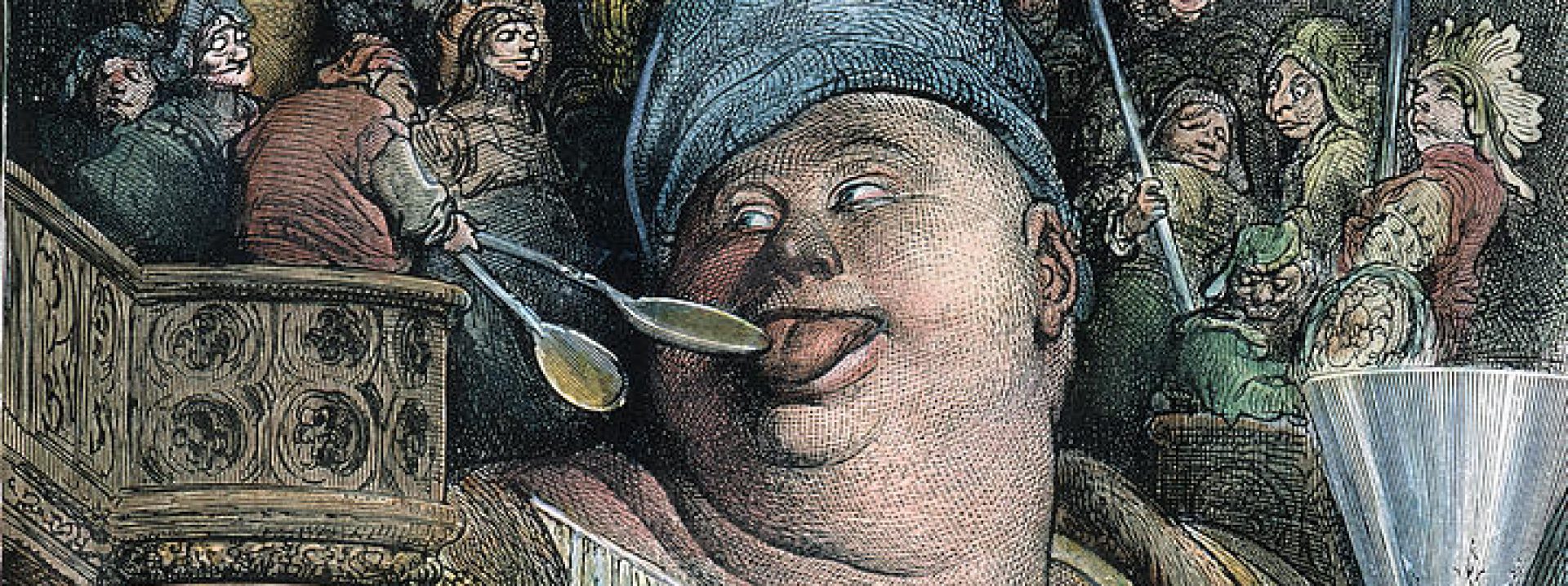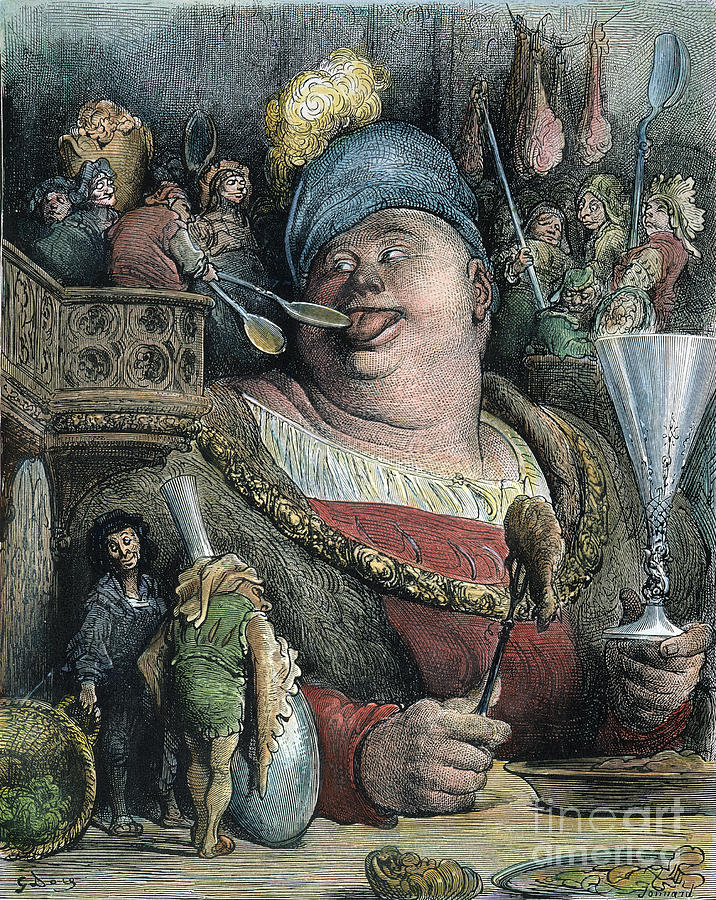I have thought for a long time whether I should write this story down and let it spread among people. It is a touching story about our hero Pantagruel saving thousands of dwarves. Although you might have been laughing with sweat for the stupidity of many characters (everyone is stupid beneath the light of Pantagruel’s wisdom), this story will make you cry.
This was a journey that happened after Pantagruel’s horrible illness. Pantagruel took Panurge and his attendants, 23 people in total, on a huge ship to the center of the Tyrrhenian Sea. They pulled into the shore of an island on the way, which was the land of dwarves.
Pantagruel had heard that dwarves were wise, and they were descendants of the Romans and Athenians who were most keen on knowledge. When he was still an infant, his father Gargantua used to tell him the stories of dwarves before bedtime. Gargantua said that dwarves were not short at first. Since they had been studying all their lives, they consumed too much body fat and gradually became shorter and shorter like burning candles(when Pantagruel came to the island, the dwarves were only 1.6 feet tall on average). And dwarves are all ugly. Because their brains consumed too much fat thinking, there was nothing to support beneath the skin, and their skin hung down like Panurge’s baggy crotch.
A few of dwarves were exploring philosophy by the seashore, and since these short scholars had also heard of Pantagruel’s reputations and stories, they immediately recognized him, went up to greet the crowd, and led them to the queen of the land, Prudentia.
As they were walking to the queen, Pantagruel and his men looked around the surroundings. The island was simply a ruin, with neither brick buildings nor gorgeous palaces. All the crops were already consumed by animals, and the farmlands looked just like some forgotten battlefields. Queen Prudentia was sitting in this barren center, reciting Virgil’s Georgics.
Pantagruel was shocked by the ugliness of Prudentia, and he was sure that she’s the ugliest among all dwarves. Her wrinkles were as deep as the deepest abyss; when Pantagruel stared at her, he felt like he was about to fall into Hades’ underworld.
But Pantagruel still remembered the etiquette of gentlemen. He lifted his belly and bowed to the queen.
“Greetings, Your Majesty,” said Pantagruel, “I am Pantagruel from France. I have long admired your wisdom, and it is my highest honor to meet you today.”
Prudentia raised her head and looked up to Pantagruel’s body for a long time, then she finally spoke.
“Young man, I also heard of your stories. I heard that you are one of the few people in France with real wisdom. But today, I question the authenticity of these stories, for wise people can not have such a big belly.”
“Your Majesty,” said Panurge, “ this big belly is the warehouse of wisdom! Our great Pantagruel eats thousands of sausages, bacon, and roast meat every day to maintain such a good belly. No one can eat as much as he does, so no one is as wise as he is!”
“What are you talking about? Sausage? Bacon?” Prudentia’s servant Fides stepped forward and asked, “I read about roast meat in books, but isn’t it just a legendary food in Latin books?”
Pantagruel immediately asked: “What are you talking about? This land is full of running animals, don’t you eat them?”
“Of course we don’t eat animals!” Fides shouted, “All the animals are taller and stronger than us. We can’t catch them at all. We eat bread and fruits planted by ourselves; if these crops are eaten by animals, we just drink the rain and eat the soil then! “
Hearing this, a nameless sorrow and grief rushed to Pantagruel’s mind. He ordered his servants to take out the best sausages and wine in the cabin. These sausages were made from the meat of wild boar, wild deer, whale, and eight kinds of livestock. Each sausage was thick and heavy like the arm of a man. As the servants made small cuts with their knives, oil gushed out and splashed on their clothes.
Having smelled the fragrance of sausage, all the dwarves put down their books and ran over. Pantagruel asked them to enjoy the mountain of sausage and ordered his servants to pour the best wine for the dwarves.
The dwarves had never eaten such delicious food, and they all climbed up to the mountain and started eating. Whenever they take a bite, the oil gushed out and flew down into the land. Because these wild fats activated the slumbering stomach, after eating for a while, the dwarves all felt abdominal pain. They ran to the field, took off their pants, and began to excrete. When the excreting was over, they felt refreshed, so they ran back to the sausage mountain and continued eating. Thus, they ate back and forth all night, and the fields were fully covered with crap. After the entire sausage mountain was consumed, the dwarves drank Patagruel’s wine. This was the first time they had drunk(dwarves were too short to build grapevine racks, so they never planted grapes). Because they couldn’t bear the charm of grapes, they all fell into a lethargic sleep and didn’t wake up until the next morning.
The dwarf who woke up the first roared and awakened other dwarves. They looked at each other and all burst into laughter. Because the fat of sausages was the best panacea, their bodies were cured and filled with fat, so everyone’s skin was smooth like that of young men. The fields irrigated by excrement and fat now grew thousands of buds and seedlings, and even the crops devoured by animals regrew.
The dwarves cheered and sang insanely. They beat the earth with bare feet like Horace told them in his Ode1.37 and rushed into their huts to tear up all the books, soaring and praising Pantagruel. And the hero they praised was still having a sweet dream on the field.


Reflection: My initial idea was to construct a grotesque body that is completely opposite to Pantagruel and then let it gradually turn into a carnivalesque body under the influence of him. I hope the images of the dwarves are extremely similar, so each of the individuals can be the representative of the whole crowd, and their changes are also collective. Bakhtin tells us about how Rabelais became acquainted with the aspect of gatherings. And I believe that Rabelais had seen how individuals got lost in a carnivalesque gathering and blent themselves into it. In this missing chapter, I hope to reflect a similar power of Carnival, which bans the hierarchy and all forms of distinction among the dwarves, so no single dwarf is described in detail as the carnival begins, and Queen Prudentia is also blent into the crowd. Moreover, I attempted to imply the idea of growth and immortality of the gathering in this chapter. Through eating and drinking, the dwarves rejuvenate and bring new lives to their land; this is the turning point of their lives where they throw away the past and look forward to the future. Rather than focusing on ancient knowledge and wisdom; they are now presenting the victory of renewal and material abundance over the past.
In this creative writing piece, I also tried to restore the tone and style of Rabelais and depicted the land of dwarves regarding his sarcastic perspective towards scholars. Considering Rabelais’ interest in classics, I used some relevant settings and thus made up the history of dwarves. I found that Rabelais often allowed the characteristics and habits of his characters to be directly reflected in the physical body, so I imitated his method and gave further depictions of the dwarves.
I absolutely loved this Eve! Wow. What a fun story! So much of it just brought about a reaction from me of “of course” and I felt like there was no better way to write it. I especially liked the references to classical works (I found Georgics especially funny, since they are all farmers!!)
I think you did a really good job in creating that collective, especially with the Queen blending in and away from everything else; I didn’t even think about the fact that she wasn’t mentioned again!
I also really enjoyed the idea of rebirth, since you describe the land as a battlefield, but then after all of the dwarves excrete all over it, the land would be renewed (just as they were) and ready to grow more wonderful things!
I loved this!! The logic of every decision seemed perfectly Rabelaisian– the image of the dwarves getting smaller like candles particularly fit right into the world of description in the novels. I also think that you’ve really captured the essence of consumption in (Bakhtin’s version of) Rabelais’ style– it rejuvenates the combined embodiment of the material (the dwarves’ skin, the field) and the psychic. Of course, the feasting and the excess is characteristic of the carnivalesque, too. One interesting element, though I’m not sure if you explicitly intended it, is the unification of totally different kinds of people through carnival– while they’re irreconcilably different in form, the dwarves and Pantagruel having something in common in festive consumption.
I enjoyed this. This seems like it could actually be part of Rabelais’ work. The story flowed well and every detail didn’t seem out of place. The images were very Rabelaisan from the sense of community to the grotesque nature of the dwarves. This was really good. I chuckled a bit while reading. I found the detail that they were going back and forth from the sausages to the field very funny. Overall nice job on this very Rabelaisan text.